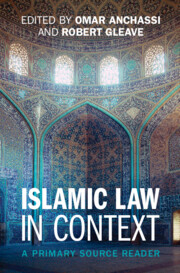Book contents
- Islamic Law in Context
- Islamic Law in Context
- Copyright page
- Contents
- Acknowledgements
- Contributors
- Introduction
- Part I Islamic Legal Theory (Uṣūl al-Fiqh) and Related Genres
- Part II Islamic Jurisprudence (Fiqh) and Related Genres
- Part III Legal Opinions (Fatwās)
- Part IV Court Judgments and Other Court Documentation
- Part V Judicial Manuals and Reference Books
- Chapter 31 Introduction to Part V
- Chapter 32 ‘The Discretion of the İmâm’
- Chapter 33 On Criminal Law
- Chapter 34 Custody Disputes and the Best Interests of the Child, from al-Murshid fī l-Qaḍāʾ al-Sharʿī (2008) by Qāḍī Iyad Zahalka
- Chapter 35 Ibn Khunayn (b. 1376/1956) on Adjudication and Judicial Organisation, from al-Kāshif fī Sharḥ Niẓām al-Murāfaʿāt al-Sharʿiyya al-Saʿūdī
- Chapter 36 Temporary Marriage in Iranian Family Law
- Chapter 37 On Scriptuaries and Pagans as Slave-Concubines
- Part VI Alternative Sources for Islamic Legal Studies
- Name Index
- Subject Index
- References
Chapter 36 - Temporary Marriage in Iranian Family Law
Mukhtaṣar-i Ḥuqūq-i Khānivādih (2015) of Sayyid Ḥusayn Ṣafāyī and Asad Allāh Imāmī
from Part V - Judicial Manuals and Reference Books
Published online by Cambridge University Press: 14 November 2024
- Islamic Law in Context
- Islamic Law in Context
- Copyright page
- Contents
- Acknowledgements
- Contributors
- Introduction
- Part I Islamic Legal Theory (Uṣūl al-Fiqh) and Related Genres
- Part II Islamic Jurisprudence (Fiqh) and Related Genres
- Part III Legal Opinions (Fatwās)
- Part IV Court Judgments and Other Court Documentation
- Part V Judicial Manuals and Reference Books
- Chapter 31 Introduction to Part V
- Chapter 32 ‘The Discretion of the İmâm’
- Chapter 33 On Criminal Law
- Chapter 34 Custody Disputes and the Best Interests of the Child, from al-Murshid fī l-Qaḍāʾ al-Sharʿī (2008) by Qāḍī Iyad Zahalka
- Chapter 35 Ibn Khunayn (b. 1376/1956) on Adjudication and Judicial Organisation, from al-Kāshif fī Sharḥ Niẓām al-Murāfaʿāt al-Sharʿiyya al-Saʿūdī
- Chapter 36 Temporary Marriage in Iranian Family Law
- Chapter 37 On Scriptuaries and Pagans as Slave-Concubines
- Part VI Alternative Sources for Islamic Legal Studies
- Name Index
- Subject Index
- References
Summary
This chapter discusses an extract from the Iranian legal textbook Mukhtaṣar-i Huqūq-i Khānivādih (‘A Concise Summary of Family Law’) of the Iranian legal scholars Sayyid Ḥusayn Ṣafāyī and Asad Allāh Imāmī. The 42nd revised edition of this text, published in Tehran in 2015, gives an overview of Iranian family law and is aimed specifically at students of law. The 472 pages of the book cover marriage, divorce, parentage, and filiation. This chapter focuses on temporary marriage (commonly known as sīgheh in Persian), which is characterised by the exact determination of the duration of the marriage when contracted. This form of marriage is permitted in Twelver Shī’ī (Imāmī) law, while being strictly rejected in all schools of Sunnī law.
Keywords
- Type
- Chapter
- Information
- Islamic Law in ContextA Primary Source Reader, pp. 375 - 383Publisher: Cambridge University PressPrint publication year: 2024

